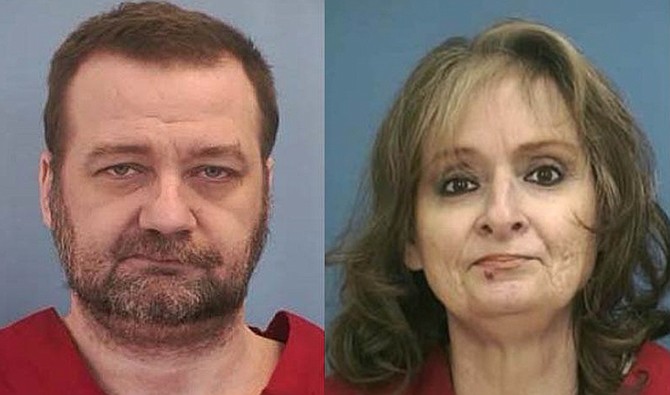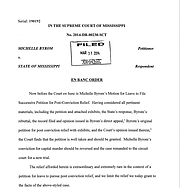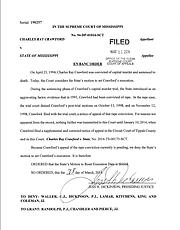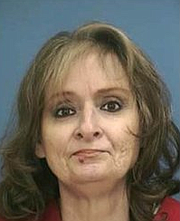The Mississippi State Supreme Court handed down two big decisions in death penalty cases. The court refused to set an execution date for Charles Ray Crawford (left) and overturned the murder conviction of Michelle Byrom (right) and ordered a new trial with a new judge.
An Innocent Woman? Michelle Byrom vs. Mississippi
Read Ronni Mott's March 19, 2014, story in the JFP that brought international attention to the tragic case of Michelle Byrom.
JACKSON — Michelle Byrom, 57, has been on death row awaiting execution for the past 14 years. By Monday, March 31, she had nearly exhausted her options. Then, in a surprising decision, the nine justices of the Mississippi Supreme Court ruled to reverse her sentence of death. Byrom, 57, has been on death row awaiting execution for the past 14 years.
In the court's unanimous decision, Justice Josiah Coleman wrote: "The relief afforded herein is extraordinary and extremely rare in the context of a petition for leave to pursue post-conviction relief."
The court also ordered a new trial with a new judge.
"This is an astonishing result—wonderful, delightful, so happy about it," said Warren Yoder, executive director of the Public Policy Center of Mississippi, who had volunteered to publicize the case.
Former Mississippi Supreme Court Justice Oliver Diaz, who heard Byrom's previous appeals during his tenure on the bench and wrote a piece for the Jackson Free Press in her support last week, emphasized the unusual nature of the decision.
"The whole decision was surprising, from the fact that it was handed down on a Monday, which is very unusual for the court in a non-emergency manner, to the recusal of the trial judge, which is also fairly unusual, through the relief that they granted," Diaz told the Jackson Free Press.
"To reverse the conviction and send it back for a new trial at this stage, the whole scope and breadth of the decision is really surprising at this point. It's not something that's normally done by the court."
In her original trial in Tishomingo County, Byrom was convicted in an alleged murder-for-hire plot in the 1999 death of her husband, Edward Byrom Sr. Sentenced to die by lethal injection, Byrom appealed her case to the Mississippi Supreme Court three times, once on direct appeal and twice more in post-conviction appeals. Each time, the court upheld the conviction.
"People don't realize it: not only just in death-penalty cases, but in criminal cases overall, it's very rare to get a reversal," Diaz said. "... I would say well over 90 percent are affirmed in all aspects, so this is really pretty remarkable."
When the U.S. Supreme Court declined Feb. 24 to hear the case, Mississippi Attorney General Jim Hood requested a March 27 execution date. That day, Byrom's attorney, David Calder of Oxford, Miss., received a slim ray of hope when the state court denied Hood's request.
The Road to the Row
Court records reveal that Byrom's original attorneys, who were trying their first capital case, made numerous errors and questionable decisions that ultimately led Byrom to death row.
In letters to his mother, Byrom's son, Edward Byrom Jr., detailed killing his father after Edward Byrom Sr. verbally berated and slapped him around.
"As I sat on my bed, tears of rage flowing, remembering my childhood, my anger kept building and building, and I went to my car, got the 9mm, and walked to his room, peeked in, and he was asleep," Edward Jr. wrote. "I walked about 2 steps in the door, and screamed, and shut my eyes, when I heard him move, I started firing."
Under questioning from Tishomingo County Sheriff David Smith, Edward Jr. made up "a bullsh*t story after another, trying to save my own ass," he wrote. "... I was so scared, confused, and high, I just started spitting the first thought out, which turned in to this big conspiracy thing, for money, which was all BS."
Based on Edward Jr.'s "bullsh*t story," the sheriff arrested him, his best friend Joey Gillis and Michelle Byrom as co-conspirators. Allegedly, Michelle Byrom was the conspiracy's mastermind, hiring Gillis to murder her husband and planning to pay him from the proceeds of Edward Byrom Sr.'s life insurance policy. Gillis was the alleged killer, and Edward Jr. allegedly helped Gillis dispose of the murder weapon, a World War II-era 9mm Luger pistol.
Prosecutor Arch Bullard sought to prove that theory of the case in court. Bullard made a deal with Edward Jr. in exchange for his testimony against his mother. Michelle Byrom's lawyers believed they could use Edward Jr.'s letters to impeach him during cross-examination, but Circuit Court judge Thomas Gardner would not allow the jury to see the letters. Instead, he admonished the defense for not revealing them to the prosecution earlier.
Although Edward Jr.'s letters may have been a surprise to Bullard, the written confessions were not a surprise to Gardner. Byrom's son had confessed to W. Criss Lott, a court-appointed forensic psychologist. Lott did not include the confession in his report to the court, but he did tell Gardner, who withheld it from the defense and the jury.
"I contacted the presiding Judge and asked him what I should do in the hypothetical situation where I had received specific information about the facts and details of a crime during the course of a forensic evaluation for mental competency and sanity," Lott said in a Feb. 3 affidavit.
"The Judge told me I should tell him what I knew and so I told him about Edward Byrom Jr.'s confession to me that he had killed his father."
Without Edward Jr.'s confessions, the jury only heard him accuse his mother of the conspiracy. They returned a guilty verdict.
Michelle Byrom's attorneys then waived her right to have a jury hear the sentencing phase of the trial, and they failed to call any witnesses to corroborate Byrom's claims of domestic and sexual abuse or the resulting mental illness, although several such witnesses were available. Gardner sentenced her to death.
Edward Jr. and Gillis both served time for the alleged conspiracy and are now free men. In a 2001 interview with The Daily Corinthian, Bullard said Gillis was not the shooter, an admission he now denies.
"We are pleased that the Mississippi Supreme Court has granted Michelle Byrom's request for relief from her death sentence," Calder said in a statement. "This was a team effort on the part of the attorneys currently representing Ms. Byrom, and we believe that the Court reached a just and fair result in light of the facts presented in this case. We are pleased that Ms. Byrom will now have the opportunity to have a new trial with effective legal representation, and that she will be given the chance to prove that she is not guilty of committing 'murder for hire.'"
The Path Ahead
National media attention drew intense focus to the case after the Jackson Free Press broke the story March 19. Outraged citizens began a call-in campaign the governor's office and volunteered to work on Byrom's behalf.
"It went viral very quickly, once people started paying attention," Yoder said. "It went down to the very last minute, which was a little scary, but I'm delighted with the result."
Hood released a statement saying that he has asked the court to specify its reasons for the reversal. The court also denied Hood an execution date for Charles Ray Crawford, whose case is on appeal as well. Byrom's new trial date has not been set.
Saying that this was "not your typical case," Diaz indicated that Byrom's story could still hold a few surprises.
"The fairy-tale ending would be that the prosecutor would review the case and realize that they didn't have the evidence and drop all charges. The Hollywood ending would be to go back for a retrial and (Byrom) be found not guilty—to have a jury say that she's not guilty," Diaz said. "In reality, anytime someone is facing criminal jeopardy, and especially in this case, potentially another death-penalty trial, it's in everybody's best interest to work that out if they can. ... You can't gamble with somebody's life. In a trial setting, there's so many uncertainties. ... If you can strike a deal where everybody goes home, that's a win."
Oxford lawyer Tom Freeland has written extensively about Byrom's ineffective counsel on his blog, NMissCommentor. Freeland expressed amazement Monday at the 11th-hour reversal.
"This is extraordinary and unprecedented to my knowledge," he wrote, adding, "Next time someone says that a death sentence is fine because of all the judges who looked at it, remember Michelle Byrom."








Comments
Use the comment form below to begin a discussion about this content.
comments powered by Disqus